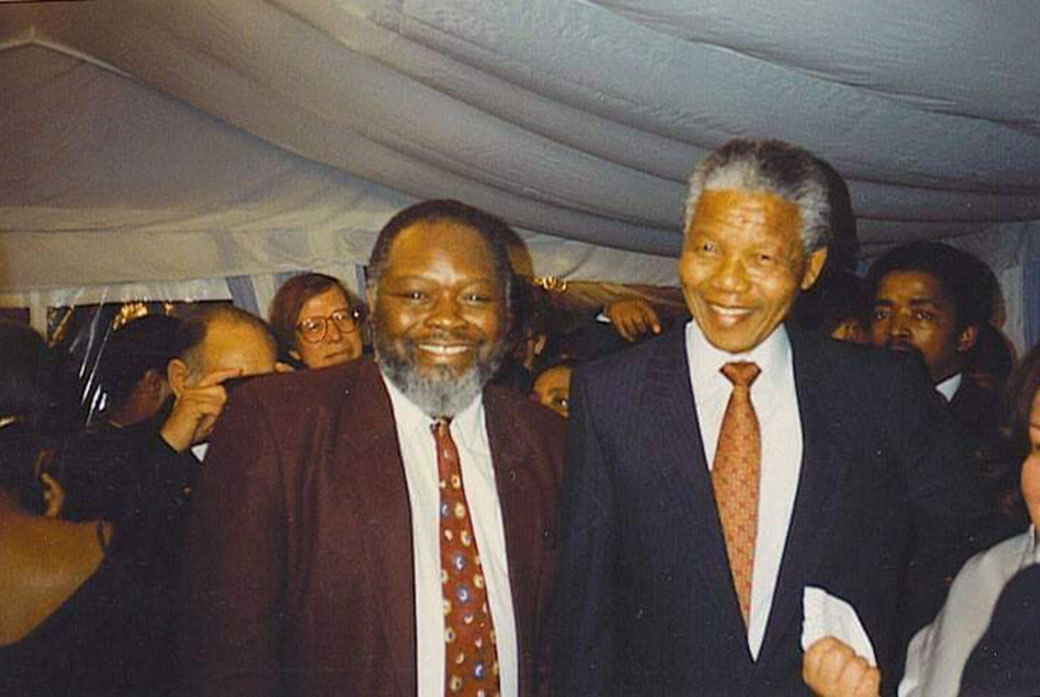Innovative MDX AI project digitises the archives of influential MP Bernie Grant
8 May 2025
/7x0:1033x697/prod01/channel_3/media/middlesex-university/news-section-images/Bernie1.jpg)
The former Tottenham MP was an outspoken and determined campaigner in calling for an end to racism in public services
Archives of the inspirational MP Bernie Grant have been digitised and can now be examined using Artificial Intelligence (AI) as part of an innovation project to explore the history of multi-cultural Britain.
Led by Professor Kurt Barling, Middlesex University’s Faculties of Arts and Creative Industries (ACI) and Science & Technology (S&T) have worked with the Bernie Grant Trust to use AI to make the newly digital archive of material related to the former Tottenham MP more accessible for researchers, students and members of the public.
Bernie Grant, who was born in Guyana and moved to Britain in the sixties with his family, was elected MP for Tottenham at the 1987 General Election and became one of the first black MPs alongside Diane Abbott, Paul Boateng and Keith Vaz.

In the House of Commons, Bernie was outspoken in calling for an end to racism across public services from housing to policing and for greater resources for inner cities. The Bernie Grant Arts Centre in Tottenham was named after him after he campaigned for greater representation for Black artistic expression.
A wealth of archive papers, publications and material from Bernie’s time in Parliament and with organisations such as the African Reparations Movement from 1963 until his death in 2000 is kept by the Bishopsgate Institute in London, on behalf of the Bernie Grant Trust.
Now the AI and Machine Learning Group from Middlesex University has brought together collaborators from Science and the Humanities to demonstrate how AI can allow users of the archive to ask questions about the life of Bernie Grant with answers provided by a generative AI search engine with direct access to the materials in the archive.
For reasons that are increasingly understood, the historical record of the black presence in Britain has been obscured and or inaccessible. The digitisation of the material in the Bernie Grant Archive is pioneering in itself, but the first steps in the application of AI to our collection by Middlesex are an exciting departure.
For teachers, researchers and others, the ability to interrogate and interact with previously hidden records potentially heralds a new era. We can envision a future in which Middlesex University’s generative AI search can be applied much more widely to other UK black archive collections, as well as to collections in the USA and Africa.
There are many blank pages in the history books, and for those trying to repair the omission and distortions of black history globally, the intelligent application of AI in this way holds out the prospect of a unique accessibility, previously impossible. We are delighted to be working with Middlesex in this significant field.
Sharon Grant OBE, who is the secretary of the Bernie Grant Trust set up in memory of her late husband. She was awarded an honorary degree from Middlesex University two years ago.
The project vision is to build a collaborative virtual environment where other digitised archives related to diaspora experiences (meaning the spread of people from their homeland) can create greater awareness of British and global diasporic histories.
David Windridge, Professor of Computer Science and Machine Learning who co-led the project, said: “It now becomes possible to pose wide-ranging questions around Bernie’s legacy and retrieve all of the supporting evidence in a transparent and accessible manner. It even becomes possible to pose, and find supporting evidence, for counterfactual questions, such as ‘What might British politics have looked like without Bernie’s activism?’
The technology underlying Bernie Grant Archive project has the potential to link stories and experiences from across diasporas, and enable the discovery of new patterns and new voices.”
Kurt Barling, Deputy Dean of Research and Knowledge Exchange, said: “The next step is to collect other community based and smaller archives to come together as a consortium with an AI back end system which links and interrogates all the archives and becomes a massive resource on diasporic histories. You could have a huge dataset which helps revaluate and find new diasporic stories as well as providing researchers at all levels with the information that helps them retell the story of the emergence of multicultural Britain.
We are liberating the stories within the archive. Any individual can interrogate the archive without specialist knowledge, schools or universities can now use it as a freely available resource. This will inevitably transform the understanding of why we are the country we now are.“
This exciting AI archive was recently launched at the 25th Anniversary Bernie Grant Memorial Lecture in the House of Commons given by Bell Ribeiro-Addy, MP for Clapham and Brixton Hill, where four students from Middlesex University had the unique opportunity of filming the event.
“Being able to say I filmed this event at such a prestigious location is not only a strong addition to my CV, but also a valuable experience that has contributed to my growth as a filmmaker,” said Xavier Grehan, a third year BA Film student who was one of the students filming.
The next stage of the project is to make the AI archive available on the existing Bernie Grant Archive within the next few months.


/0x37:1040x744/prod01/channel_3/media/middlesex-university/news-section-images/Ant-Chrissy-Stephanie_Pride-Awards.jpg)
/8x0:1033x697/prod01/channel_3/media/middlesex-university/news-section-images/2026/Andy-Reed.jpg)
/8x0:1033x697/prod01/channel_3/media/middlesex-university/news-section-images/2025/LSID-LAUNCH-55.jpg)